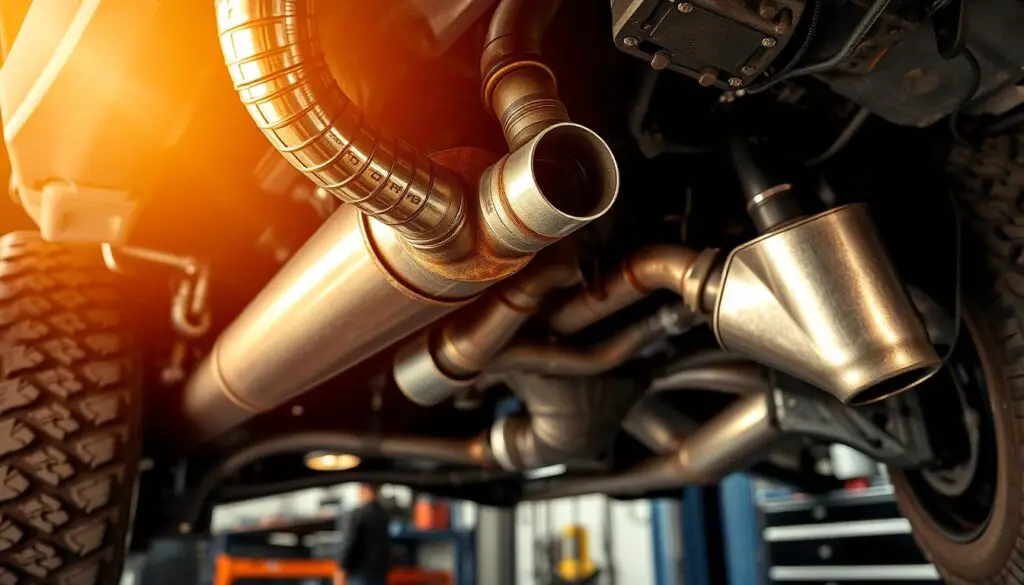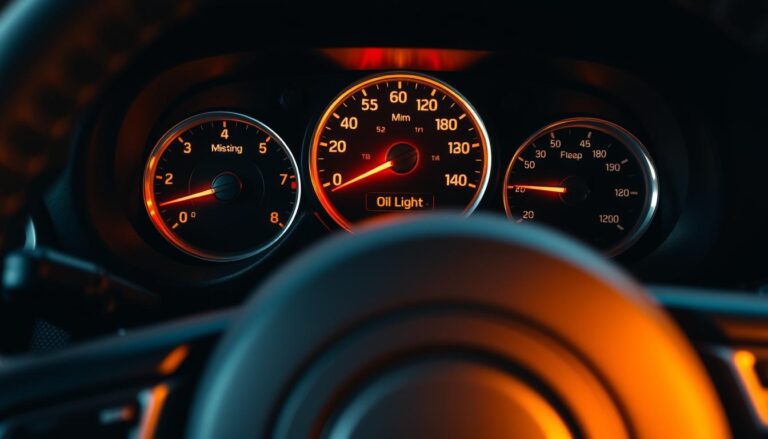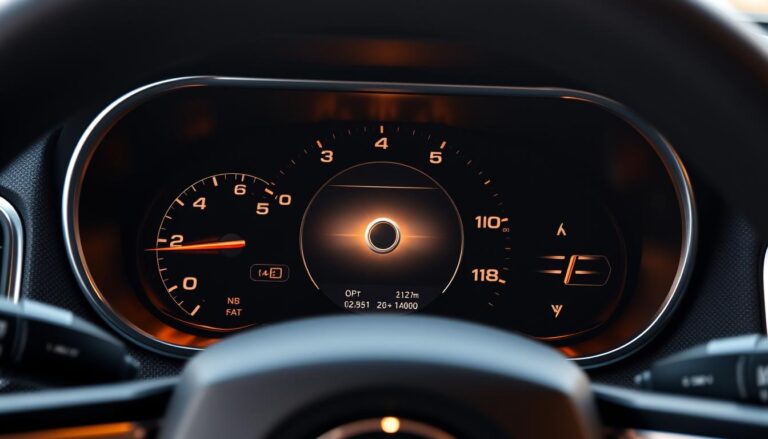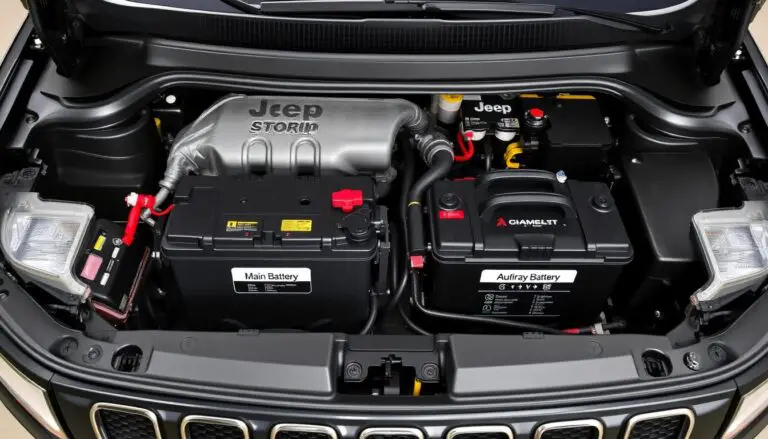Owners of Jeeps often notice that their vehicles can be quite noisy. The rugged design and capability of Jeeps can sometimes contribute to a louder driving experience. Understanding the sources of this noise is the first step in addressing the issue.
A loud Jeep can be attributed to various factors, including the vehicle’s design, maintenance, and aftermarket modifications. Identifying the root cause of the Jeep noise is crucial for finding an effective solution.
Key Takeaways
- Understanding the sources of Jeep noise is essential for addressing the issue.
- The design and capability of Jeeps can contribute to a louder driving experience.
- Maintenance and aftermarket modifications can impact the noise level of a Jeep.
- Identifying the root cause of Jeep noise is crucial for finding an effective solution.
- Addressing Jeep noise can enhance the overall driving experience.
Understanding Jeep’s Natural Sound Profile
Jeeps, by design, tend to be louder than many other vehicles due to their construction and purpose. Their ruggedness and off-road capabilities come with a distinctive sound profile that sets them apart from other cars on the road.
Why Jeeps Are Naturally Louder Than Other Vehicles
Jeeps are built for durability and to withstand harsh conditions, which often results in a louder driving experience. The use of heavier-duty components, such as axles and suspension systems, contributes to the increased noise levels. Additionally, the design features that enable Jeeps to perform well off-road, like higher ground clearance and larger tires, also play a role in their louder sound profile.
Normal vs. Abnormal Jeep Noises
It’s essential to differentiate between normal operational noises and those that may indicate a problem. Normal sounds include the hum of the engine, the rumble of the exhaust, and the thud of larger tires. Abnormal noises, however, could be clunking sounds from the suspension or unusual vibrations, which may signal a need for maintenance or repair.
Sound Characteristics of Different Jeep Models
Different Jeep models have distinct sound characteristics. For instance, the Wrangler is known for its robust exhaust note, while the Grand Cherokee may produce a more refined driving sound. Understanding these differences is key to identifying what’s normal for your specific Jeep model.
| Jeep Model | Typical Sound Characteristics |
|---|---|
| Wrangler | Loud exhaust note, robust engine sound |
| Grand Cherokee | More refined engine sound, less exhaust noise |
| Cherokee | Balanced between on-road comfort and off-road capability sounds |
Why Is My Jeep So Loud: Common Causes and Solutions
A loud Jeep can be more than just an annoyance; it’s often a sign of an underlying issue that needs to be addressed. Understanding the common causes of excessive noise in Jeeps is crucial for identifying and fixing the problem.
Exhaust System Issues
The exhaust system is a common source of noise in Jeeps. Issues within this system can lead to significant increases in noise levels.
Damaged Mufflers and Catalytic Converters
A damaged muffler or catalytic converter can cause your Jeep to become unusually loud. The muffler is designed to reduce noise, while the catalytic converter helps in reducing emissions. When either of these components is damaged, it can lead to increased noise levels.
Exhaust Leaks and Broken Hangers
Exhaust leaks and broken hangers are other common issues. Leaks can cause the exhaust gases to escape prematurely, leading to louder operation. Similarly, broken hangers can cause the exhaust system to vibrate or rattle, adding to the noise.

Tire and Wheel Problems
Tire and wheel issues are another significant source of noise in Jeeps. The type of tires used and their condition can greatly affect the overall noise level.
Aggressive Tread Patterns
Jeeps equipped with tires having aggressive tread patterns tend to be noisier. These tread patterns are designed for off-road capability but can increase road noise.
Uneven Wear and Balancing Issues
Uneven tire wear and improper wheel balancing can also contribute to increased noise levels. Regular tire rotation and balancing can help mitigate these issues.
Engine-Related Noise Sources
Engine-related problems can also cause your Jeep to be louder than usual. Various components within the engine can be the source of the noise.
Loose Components and Belts
Loose engine components or worn-out belts can cause rattling or other noises. Ensuring that all components are tightened and belts are in good condition is essential.
Bearing and Valve Train Noise
Worn-out bearings or issues with the valve train can also lead to increased engine noise. These problems often require professional diagnosis and repair.
By understanding these common causes of noise in Jeeps, owners can take the first step towards diagnosing and fixing the issue, potentially leading to a quieter and more comfortable driving experience.
Diagnosing Specific Jeep Noise Types
Diagnosing unusual noises in your Jeep can be a challenging task. Different noises can indicate various problems, ranging from minor issues to serious mechanical faults. Understanding the type of noise your Jeep is making is the first step in diagnosing the problem.
Rattling and Vibration Noises
Rattling and vibration noises are often related to loose or worn-out parts. Common causes include loose heat shields, worn-out engine mounts, or loose belts. Inspecting these components can help identify the source of the noise.
Humming and Whining Sounds
Humming and whining sounds typically indicate issues with the drivetrain or wheel bearings. Worn-out wheel bearings or faulty differential gears can cause these noises. A thorough inspection of the drivetrain components is necessary to diagnose the issue.
Wind and Road Noise
Wind and road noise can be caused by aerodynamic issues or worn-out tires. Checking the tire condition and ensuring proper inflation can help reduce road noise. Aerodynamic modifications can help minimize wind noise.
Knocking and Clunking Noises
Knocking and clunking noises often indicate suspension or steering issues. Worn-out ball joints, control arms, or steering components can cause these noises. Inspecting the suspension and steering system is crucial to diagnose the problem.
| Noise Type | Possible Causes | Diagnostic Steps |
|---|---|---|
| Rattling/Vibration | Loose heat shields, worn-out engine mounts | Inspect loose parts, check engine mounts |
| Humming/Whining | Worn-out wheel bearings, faulty differential gears | Inspect drivetrain components, check wheel bearings |
| Wind/Road Noise | Aerodynamic issues, worn-out tires | Check tire condition, ensure proper inflation |
| Knocking/Clunking | Worn-out ball joints, control arms | Inspect suspension and steering system |
DIY Fixes for a Quieter Jeep
Jeep owners often find themselves dealing with excessive noise, but there are several DIY fixes that can help. Reducing the noise level in your Jeep not only enhances your driving experience but also contributes to a more comfortable ride.
Exhaust System Modifications and Repairs
One of the primary sources of noise in Jeeps is the exhaust system. Modifying or repairing this system can significantly reduce the overall noise level. Consider upgrading to a high-performance muffler or replacing worn-out exhaust components. For more information on identifying common car sounds and their causes, you can visit this resource.
Tire Selection and Maintenance for Noise Reduction
The type of tires used and their maintenance play a crucial role in the overall noise level of your Jeep. Selecting tires designed for reduced noise and ensuring they are properly inflated can make a significant difference. Regularly checking tire pressure and rotating tires can also help in minimizing noise.
Sound Insulation Installation
Sound insulation is an effective way to reduce the noise inside your Jeep. This can be achieved by installing insulation materials in various parts of the vehicle.
Floor and Firewall Insulation
Adding insulation to the floor and firewall can significantly reduce engine and road noise. Use sound-deadening materials like mass-loaded vinyl or spray foam insulation for best results.
Headliner and Door Panel Solutions
Upgrading the headliner and door panels with sound-absorbing materials can further reduce the noise level. Consider using acoustic foam or sound-absorbing panels designed for automotive use.
Wind Noise Reduction Techniques
Wind noise is another common issue in Jeeps, particularly those with soft tops. Implementing a few simple techniques can help mitigate this problem.
Door Seal Replacement
Replacing worn-out door seals with new ones can significantly reduce wind noise. Ensure the new seals are properly aligned and fitted.
Hardtop vs. Soft Top Considerations
The choice between a hardtop and soft top can also impact wind noise. Hardtops generally offer better sound insulation than soft tops. If you prefer a soft top, consider using additional soundproofing materials to reduce wind noise.
| DIY Fix | Noise Reduction Benefit |
|---|---|
| Exhaust System Modifications | Significant reduction in exhaust noise |
| Tire Selection and Maintenance | Reduces road noise and vibration |
| Sound Insulation Installation | Minimizes engine, road, and wind noise |
By implementing these DIY fixes, Jeep owners can enjoy a quieter and more comfortable driving experience. Whether it’s modifying the exhaust system, selecting the right tires, or installing sound insulation, there are numerous ways to reduce the noise level in your Jeep.
Preventative Maintenance for Noise Control
One of the most effective ways to control noise in your Jeep is through regular preventative maintenance. By staying on top of routine checks and maintenance tasks, you can identify and address potential issues before they become major problems.
Regular Inspection Schedule
Establishing a regular inspection schedule is vital for maintaining your Jeep’s overall health and reducing noise. Check your vehicle’s manual for recommended inspection intervals, and make sure to include checks on wear and tear on parts like brake pads and suspension components.
Lubrication Points to Reduce Squeaks
Lubricating key points can significantly reduce squeaks and other noises. Focus on areas like door hinges, suspension parts, and other moving components. Using the right lubricant can make a big difference in minimizing unnecessary noise.
Fastener Tightening and Replacement
Loose fasteners can cause a variety of noises, from rattling to clunking sounds. Regularly check and tighten loose fasteners, and replace any that are damaged or worn out.
Aftermarket Solutions for Noise Reduction
In addition to standard maintenance, consider aftermarket solutions to further reduce noise. Products like sound insulation materials and noise-reducing exhaust components can be effective.
| Maintenance Task | Frequency | Benefit |
|---|---|---|
| Lubricate door hinges | Every 6 months | Reduces squeaking noise |
| Check and tighten fasteners | Every 3 months | Minimizes rattling and clunking noises |
| Inspect brake pads | Every 10,000 miles | Prevents grinding noises |
By following these preventative maintenance tips, you can significantly reduce noise levels in your Jeep and ensure a smoother, quieter ride.
Summary of Jeep Noise Causes and Fixes
Understanding the causes of excessive noise in your Jeep is crucial for maintaining a comfortable driving experience. As discussed, various factors contribute to a loud Jeep, including exhaust system issues, tire and wheel problems, and engine-related noise sources.
By identifying the specific type of noise your Jeep is making, you can take the necessary steps to address the issue. Whether it’s a rattling or vibration noise, a humming or whining sound, or wind and road noise, there are DIY fixes and preventative measures available to reduce the noise.
Regular inspection and maintenance, such as lubricating squeaky parts and tightening loose fasteners, can also help minimize noise. Additionally, aftermarket solutions like sound insulation installation and exhaust system modifications can be effective in reducing Jeep noise.
In conclusion, by understanding the common causes of Jeep noise and implementing the necessary fixes and preventative measures, you can enjoy a quieter and more comfortable driving experience. By following the tips and guidelines outlined, you can take the first step towards a more enjoyable Jeep ownership experience.
FAQ
What are the most common causes of a loud Jeep?
The most common causes of a loud Jeep include issues with the exhaust system, tire and wheel problems, and engine-related noise sources. Damaged mufflers and catalytic converters, aggressive tread patterns, and loose engine components are some of the specific factors that can contribute to a Jeep’s noise level.
How can I diagnose the source of the noise in my Jeep?
To diagnose the source of the noise in your Jeep, you can start by identifying the type of noise, such as rattling, humming, or knocking. You can then investigate the potential causes, such as loose components, worn-out bearings, or uneven tire wear. Regular inspections and maintenance can also help you identify and address potential issues before they become major problems.
Can I reduce the noise level of my Jeep with DIY fixes?
Yes, there are several DIY fixes that can help reduce the noise level of your Jeep. These include modifying or repairing the exhaust system, selecting tires with a less aggressive tread pattern, and installing sound insulation materials. You can also reduce wind noise by replacing door seals and considering a hardtop or soft top.
How can I prevent my Jeep from becoming too loud?
To prevent your Jeep from becoming too loud, you can follow a regular inspection schedule, lubricate key points to reduce squeaks, and tighten and replace fasteners as needed. You can also consider aftermarket solutions for noise reduction, such as sound insulation materials and exhaust system upgrades.
Are some Jeep models naturally louder than others?
Yes, different Jeep models have distinct sound characteristics, and some are naturally louder than others. For example, the Wrangler is known for its rugged and loud sound profile, while other models like the Grand Cherokee may be generally quieter.
Can aftermarket modifications affect my Jeep’s noise level?
Yes, aftermarket modifications can affect your Jeep’s noise level. For example, installing a performance exhaust system or larger tires can increase the noise level, while adding sound insulation materials or replacing the muffler with a quieter one can reduce it.


